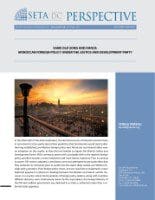
Moroccan Foreign Policy Under the Justice and Development Party
September 13, 2013In the aftermath of the Arab revolutions, the electoral success of Islamists worried many in non-Islamist circles.
In the aftermath of the Arab revolutions, the electoral success of Islamists worried many in non-Islamist circles, partly due to their prediction that the Islamists would seek to alter the long-established, pro-Western foreign policy axes. Moroccan non-Islamist elites were no exception on this matter, as they did not hesitate to equate the Islamist Justice and Development Party's (PJD) coming to power with a probable shift in the regime's foreign policy priorities towards a more isolationist and more Islamic trajectory. Prior to coming to power, PJD seniors adopted a conciliatory tone and attempted to persuade elites that they harbored no revisionist plans to undermine the state's deep-rooted, pro-Western foreign policy positions.
Their foreign policy vision, at most, would be to implement a more balanced approach in Morocco's dealings between the Western and Islamic worlds. However, in a country where the boundaries of foreign policy options, along with countless different domains, were meticulously drawn by the royal palace, the Foreign Ministry of the PJD-led coalition government was destined to act like a conformist rather than a reformist state apparatus...Continue Reading




























